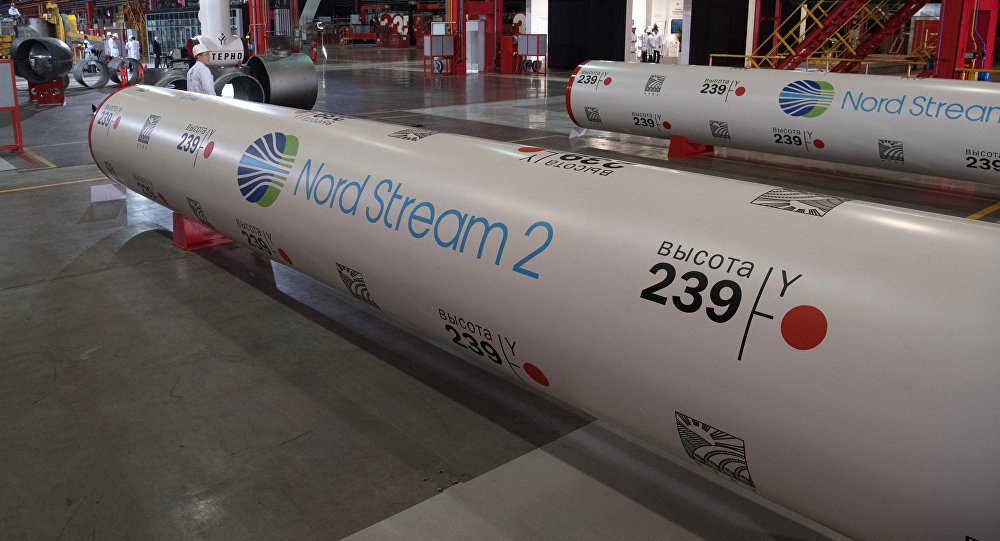Russia is determined to preserve and even increase its clout within Europe. The state-owned energy company Gazprom is ready to construct a Nord Stream-3 gas pipeline.
"We have always said that we will supply Europe with gas as much as necessary,” Gazprom Board Deputy Chairman Aleksandr Medvedev said.
“We have proven reserves, we have transport capacities, we are building new transport routes. If Europe declares its needs that it is ready to sign the necessary contracts, then I do not exclude that there will be still need for new gas transport projects - Nord Stream-3, for example," Medvedev said.
The Nord Stream-2 gas pipeline currently under construction along the bottom of the Baltic Sea will link Russia and Germany, bypassing the usual transit countries of Ukraine and Poland.
Medvedev said gas production from the Netherlands’ largest Groningen gas field has dropped, and Russia could fill the gap in demand. Dutch Prime Minister Mark Rutte also spoke about the reduction in gas production from Groningen last month, saying that by 2022, the Dutch government will cut annual gas production from the deposit up to 12 billion cubic meters, and completely stop by 2030.
"If we talk about our share in imports, it is over 60 percent. This reflects the level of interdependence that we have reached with our European consumers. We do not set share targets, but we will not reduce it exactly," Medvedev said.
Gazprom expects to receive permission from Sweden sometime in the very near future to build out Nord Stream-2 gas pipeline through its territory. According to Medvedev, the Danish Foreign Ministry will also make a recommendation to this end to the country’s Energy Ministry to issue permission.
"We expect that Sweden will issue a permit before the end of April, and Denmark through its Foreign Ministry will advise the relevant Energy Ministry to issue a permit," the Gazprom official said, noting that political factors may interfere with the situation, although Europe is well aware of its economic interests associated with the implementation of the Nord Stream-2 project.
Nord Stream-2 meets all of the required technical standards and poses no new environmental risks, Medvedev added, saying there should be no reason to delay issuing a permit for its construction.
The European demand for gas supplied by Russia is growing. In Medvedev’s opinion, after the new Russian gas transmission lines to Europe and China, such as Nord Stream-2 and Power of Siberia, are commissioned, Gazprom's annual export deliveries to foreign countries will reach above 200 billion cubic meters by 2020.
In the meantime, Gazprom plans to increase gas production in 2018 by one percent compared to last year's figure, or up to 475.8 billion cubic meters. According to Gazprom’s Deputy Board Chairman Vitaly Markelov, gas condensate production, as planned, will amount to 15.2 million tons and oil to about 40.9 million tons.
"The production plan for the current year is 475.8 billion cubic meters of gas; 15.2 million tons of gas condensate and 40.9 million tons of oil," he said. Markelov recalled that in 2017, Gazprom's actual production amounted to 471 billion cubic meters of gas, 15.9 million tons of gas condensate and 40.9 million tons of oil.
With these developments underway, Gazprom CEO Aleksey Miller commented on the situation around the statement by Chancellor Angela Merkel that Germany will quit Nord Stream-2 if Russia stops gas supplies through Ukraine.
At the moment, thanks to the launch of the new project, the resources will move to the north. “There will simply not be resources in the previous volumes [for the central transport corridor]," Miller said.
The German government approved the laying of Nord Stream-2 that will increase the capacity of the Nord Stream main line, and allow direct gas supplies by bypassing Ukraine, Poland and Belarus.
"Merkel's statement means an official rejection of the Nord Stream-2 in case Russia does not guarantee the continuation of gas transit through Ukraine. Germany gave the official consent to the implementation of this project - and now Merkel, in fact, publicly withdraws this consent," geopolitical expert Mikhail Delyagin, in a comment on Angela Merkel’s position, said, according to Nevnov news.
Delyagin noted that Merkel's words have no real technical basis, however, since Ukraine’s gas transport system leaves much to be desired, and the period of safe transit ends in 2019. Russia upgraded its major gas pipelines, including export pipelines, in the 2000s, and did it, according to Delyagin, without much publicity so as not to frighten consumers and investors.







 Iran's senior military leaders described the drone and missile attack on Israel on April 14 night as “successful".
Iran's senior military leaders described the drone and missile attack on Israel on April 14 night as “successful".
 Azerbaijan officially unveiled the logo for the upcoming 29th session of the Conference of the Parties to the United Nations Framework Convention o...
Azerbaijan officially unveiled the logo for the upcoming 29th session of the Conference of the Parties to the United Nations Framework Convention o...
 Iranian President Ebrahim Raisi warned Israel that it would face a "real and extensive" response if it makes any "mistake" following Tehran’s missi...
Iranian President Ebrahim Raisi warned Israel that it would face a "real and extensive" response if it makes any "mistake" following Tehran’s missi...



